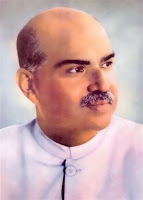Ayodhya Judgement - dawn of sacred, secular and spiritual India
Ayodhya Judgement -
dawn of sacred, secular and spiritual
India
A
Ayodhya Judgement -Reinforcement of Historical
Process of Assimilation
Para1of
Ayodhya Judgement
".
These first appeals centre around a dispute between two religious communities
both of whom claim ownership over a piece of land admeasuring 1500 square yards
in the town of Ayodhya. The disputed property is of immense significance to
Hindus and Muslims. The Hindu community claims it as the birthplace of Lord
Ram, an incarnation of Lord Vishnu. The Muslim community claims it as the site
of the historic Babri Masjid built by the first Mughal Emperor, Babur. The
lands of our country have witnessed invasions and dissensions. Yet they have assimilated
into the idea of India everyone who sought their providence, whether they
came as merchants, travellers or as conquerors. The history and culture of this
country have been home to quests for truth, through the material, the
political, and the spiritual..."
Para77of
Ayodhya Judgement
..."Above all,
the practice of religion, Islam being no exception, varies according to the
culture and social context. That indeed is the strength of our plural society.
Cultural assimilation
is a significant factor which shapes the manner in which religion is practiced.
In the plural diversity of religious beliefs as they are practiced in India,
cultural assimilation cannot be construed as a feature destructive of religious
doctrine. On the contrary, this process strengthens and reinforces the true
character of a country which has been able to preserve its unity by
accommodating, tolerating and respecting a diversity of religious faiths and
ideas"...
Para88of
Ayodhya Judgement
"The Places of
Worship Act which was enacted in 1991 by Parliament protects and secures the
fundamental values of the Constitution. The Preamble underlines the need to
protect the liberty of thought, expression, belief, faith and worship. It
emphasises human dignity and fraternity. Tolerance, respect for and acceptance
of the equality of all religious faiths is a fundamental precept of fraternity.
This was specifically adverted to by the Union Minister of Home Affairs in the
course of his address before the Rajya Sabha on 12 September 1991 by stating:
―I believe that India is known for
its civilization and the greatest contribution of India to the world
civilization is the kind of tolerance, understanding, the kind of assimilative
spirit and the cosmopolitan outlook that it shows…
The Advaita philosophy…clearly says
that there is no difference between God
and ourselves.... "
Resonance of Constituent Assembly Debates on historical process of assimilation.
The Honourable Shri
K. Santhanam said in the Constituent
Assembly on 8 Dec 1948 "...At the same time, we should not interfere
with the historical process of assimilation. We ought not to
think that for hundreds and thousands of years to come these linguistic
minorities will perpetuate themselves as they are. The historical
processes should be allowed free play. These minorities should be
helped to become assimilated with the people of the locality. They should
gradually absorb the language of the locality and become merged with the
people there. Otherwise they will be aliens, as it were, in those
provinces. Therefore, we should not have rigid provisions by which
every child is automatically protected in what may be called his
mother-tongue. On the other hand, this process should not be sudden, it
should not be forced. Wherever there are large numbers of children, they
should be given education—primary education—in their own mother-tongue. At
the same time, they should be encouraged and assisted to go to the
ordinary schools of the provinces and to imbibe the local tongue and get
assimilated with the people. "
B
Ayodhya Judgement can
be better appreciated by understanding Secularism
in India as per Constituent Assembly Debates
It
is imperative to know the truth behind this term "secularism" in
India .Meaning and interpretation was debated in the Assembly on
several occasions. It is relevant to mention the debate dated 27
December 1948 of Constituent Assembly for the amendment no 1146
standing in the name of H .V. Kamath. Debates on
the Amendment no 1146 clearly, explicitly and precisely underlines
in the meaning of secularism in the India.
Amendment
No. 1146, as moved and adopted , was as follows:-
"That
in the affirmation or oath in article 49, for the words 'I, A. B. do solemnly
affirm (or swear)', the following be substituted:-
'In the name of God, I, A. B, do
swear'
or alternatively,
'I, A. B. do solemnly affirm'."
...
I would appeal to the House that we are heirs to an immortal and a spiritual
heritage, a heritage Which is not physical, nor material nor temporal: a
heritage which is of the spirit--a spirit that is, ever was, and ever shall be,
a heritage that is eternal. Let us not squander this invaluable heritage. Let
us not dissipate this heritage: let us remain true to our ancient
heritage, our spiritual genius. Let us not lightly cast away the torch
that has been handed down to us from time immemorial. Let us in the words
of Swami Vivekananda aspire to conquer the world spiritually. Let us blaze
forth a trail that will be the light of the world as long as the sun and moon
and stars endure. I shall only end with the words which were ever on Mahatma
Gandhi's lips:
"Ishwar Allah tere nam
Sabko sanmati de Bhagvan."
Sabko sanmati de Bhagvan."
...Some vain kind of politicians in their
attempt to imitate some fashionable slogans of the West have allowed
themselves to believe that in a secular State God is taboo. A secular State
means the state of Truth and God and eternity without prejudice to any
particular religion. In India all our culture, and all our policy and
civilization has been spun and woven round the one nucleus, God, and if
God is banished I do not know what Swaraj will mean to India. Personally I
along with so many others, seniors and juniors, and millions of people fought
for thirty years for Swaraj. The Swaraj of my conception was Ram Raj. It
was not the political freedom alone that mattered. If I may be permitted to say
so, I care a tuppence for political freedom. India did not only mourn the loss
of her political freedom but her real grief has been the loss of her freedom of
spirit. Our spiritual freedom was first hit when Somnath was attacked.Since
that time, all these hundreds of years, India has not been feeling free. Real
Swaraj means "Ram Raj" How this idea of secularity has been
misinterpreted, I will not be going out of the subject if I take the house into
confidence and inform them that very recently at a conference of A. I. R.
officials they came to the unanimous decision that the recitation of the Gita
and the Ramayana, the Koran and the Bible should now be stopped. If secular
State means that our children will not know about the Ramayana or listen to the
Gita or the Koran or the Granth what is political freedom worth? This is
stretching the meaning too far. If God is banished from this "Ram
Rajya", India will become Ayodhya without Ram....
"...Even in the British Parliament, when they assemble, they do so only after prayers. They hold prayers. In the proceedings you will find that the Parliament met at such and such an hour and after 'prayer' began their proceedings. Theirs is not a communal State too. In Ireland, as also in many other places, God is not forgotten.... We worship God and our faith must be recorded. India believes in God and therefore the Indian State must remain a State of God. It must be a godly State and not a godless State. This is our meaning of secularity..."
C
Sri Ram- Maryada
Purushottam- in original Constitution of India
Artistic work of Nandlal Bose in original Constitution
of India has included the Scene from Ramayan which depicts Sri Ram , Sita and
Laxman returning from the Lanka after victory over Ravan. That Sri Ram Chandra
ji has been the Aryan ideal of land of veda has been beautifully described by
Sri Aurobindo
"The
distinction that India draws is not between altruism and egoism but between
disinterestedness and desire. The altruist is profoundly conscious of
himself and he is really ministering to himself even in his altruism; hence the
hot & sickly odour of sentimentalism and the taint of the Pharisee which
clings about European altruism. With the perfect Hindu the feeling of self has
been merged in the sense of the
universe; he does his duty equally whether it happens to promote
the interests of others or his own; if his action seems oftener altruistic than
egoistic it is because our duty oftener coincides with the interests of others
than with our own. Rama’s duty as a son calls him to sacrifice himself,
to leave the empire of the world and become a beggar& a hermit; he does it
cheerfully and unflinchingly: but when Sita is taken from him, it is his duty
as a husband to rescue her from her ravisher and as a Kshatriya to
put Ravana to death if he persists in wrongdoing. This duty also he pursues
with the same unflinching energy as the first. He does not shrink from the path
of the right because it coincides with the path of self-interest".01CWSA
236
D
Conclusion
That French revolution brought ideals of Liberty, Equality and Fraternity for human
race. Sri Aurobindo writes that Liberty and Equality has been achieved to some
extent in various forms but Ideal of Fraternity has not seen the light of the day. Microcosmic harmony could be seen in the
Auroville . After
the formation of United Nations , our planet -Earth has witnessed , inter
alias, one place aspiring for Human Unity i.e. Auroville in Asia which
has been acknowledged by UNESCO by its resolutions in years-1966,1968,1970 and
1983.. This judgment
is the macrocosm of human unity and fraternity. As a matter of fact this judgment
explicitly underlines that India has not only welcomed but nurtured and preserved all who
have come to India and Indianised themselves
irrespective of the merchants, traders , invaders and missionaries.
As a matter of fact
one can feel some shades of Truth and
Reconciliation Commission of South Africa while reading the judgement.
Year 2019 is also 550
birth centenary of Guru
Nanak Dev ji .Pronouncement of Ayodhya judgement on the auspicious day of inauguration
of Kartarpur Corridor has spiritual significance. Indeed demolition of Berlin
wall three decades ago on the same day underlines the significance of the judgement for India.
That this judgment is
based on the recognition of faith only is the disinformation. Both the parties
were given due time and procedure to establish their claims. Whoever has been
able to establish the case must get benefit of the evidence. . Faith of the
parties has been accepted to the extent parties have been able to establish
with the support of material evidence.
To conclude ,this judgment
is as important as the working of the Constituent Assembly which resulted in the adoption of Constitution
of India on 26 November 1949. Unity and integrity of India has been the motivating force in the writing
of the judgment where both parties to the suit has been given space to worship.
Drawing the inferences for other temples and mosques would be an act of
mischief .As a matter of fact,it is high
time for the people of India to follow
and reaffirm the ideals of Sri Ram- Maryada Purushottam in all walks of
life .



Comments
Post a Comment